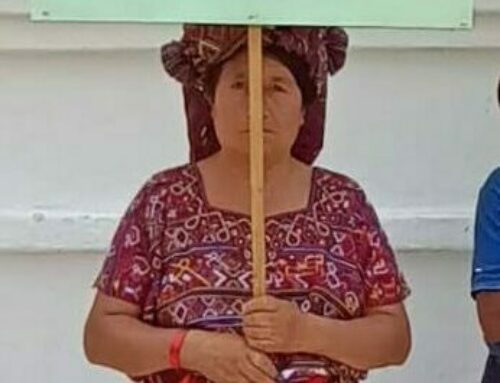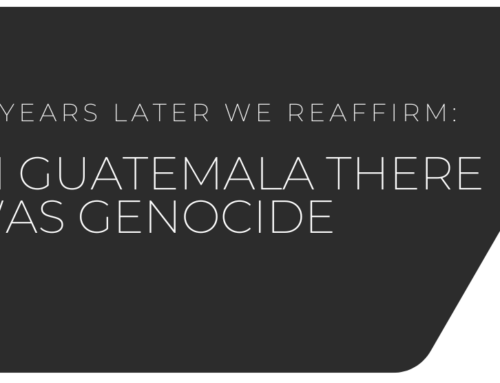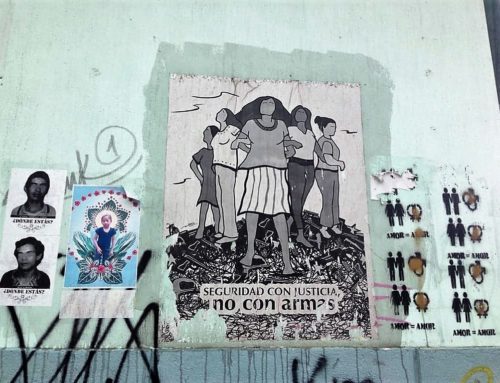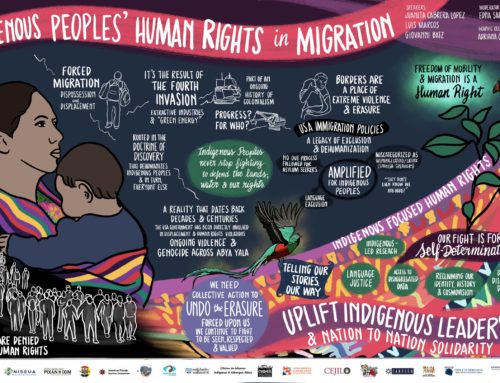Project Description
No Asylum Cooperative Agreements with Central America
The cancellation of the ACAs with Guatemala, El Salvador, and Honduras is the result of grassroots organizing across Abiayala and Turtle Island (the so-called Americas). We thank the 40+ organizations we’ve coordinated with in the campaign against the ACAs, and honor all other efforts that also contributed to this win. Thank you especially to the thousands of individuals who took grassroots actions against the ACAs. We know that the work is far from over. Today we recommit to ending pandemic deportations and Title 42 expulsions.
In July 2019, the Guatemalan Interior Minister and the acting Secretary of the Department of Homeland Security signed an Asylum Cooperative Agreement (ACA), also known as a “safe third country agreement.” This signing came after the Guatemalan Constitutional Court ordered former President Morales not to sign the agreement without congressional approval. After Trump threatened to ban Guatemalans with lawful U.S. visas and to tax remittances, Morales sent his Interior Minister to sign. In the following weeks, El Salvador and Honduras signed similar agreements.
The ACAs give the U.S. power to transfer asylum-seekers to Guatemala, Honduras, and El Salvador if the transferee is not from the country to which they are sent. The supposed idea is that asylum-seekers should seek asylum in one of these three countries, despite their complete lack of capacity to responsibly process asylum cases and their general unsafe conditions. By deporting asylum-seekers to countries they are not from and to places where they may face danger, the U.S. denies them protection and violates international refugee law.
“People flee Guatemala due to the violent imposition of resource extraction without consultation. Now, the state wants to deport asylum-seekers to Indigenous territory without consultation. The state does not care for Guatemalans, how will it care for migrants that the U.S. wants to throw away?”
– Rubén Herrera, Departmental Assembly of Peoples of Huehuetenango (ADH)
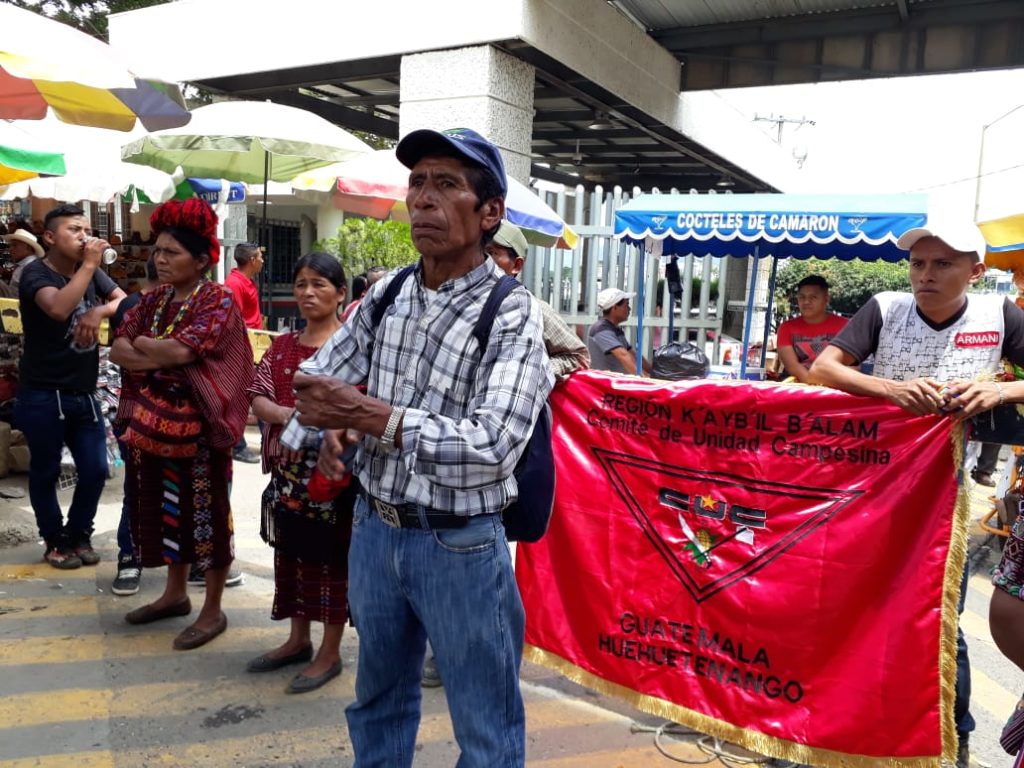
Three hundred community members organized by the ADH took over the Mesiilla check point on the Guatemala-Mexico border on August 9, protesting the “safe third country” agreement, systemic impunity & the invasion of their territorries by extractive industry. Photo credit: Departamental Assembly of Peoples of Huehuetenango (ADH)
Due to the pandemic, on March 17th the Guatemalan government announced a temporary suspension of the ACAs. This suspension has not terminated the agreements with Guatemala, El Salvador, and Honduras, and transfers are scheduled to resume as soon as “sanitary protocols are established.” At the same time, similar human rights violations have continued through ongoing standard deportations of migrants and expulsions of asylum-seekers under DHS’s implementation of the CDC border rule. Between March and October 2020, 63,000 people were deported and 140,000 asylum-seekers were expelled, mostly to Mexico or the countries from which they fled. 8,000 of the expelled asylum-seekers were unaccompanied minors. These deportations and expulsions not only violate due process and legal protections for migrants and asylum-seekers, they also are exporting COVID-19 to countries with crumbling medical infrastructures.
To stop these inhumane and illegal ACAs, deportations, and expulsions, we need major people power. Join us!
Despite state efforts to obscure information about the agreements, resources exist. We recommend:
- “The dangers of Trump’s ‘safe third country’ agreements in Central America” by AFSC
- “Policy Memo: U.S.-Central America Asylum Agreements are Cruel and Unworkable” by WOLA, LAWG, AFL-CIO, KIND, Alianza Américas, Women’s Refugee Commission, and Center for Gender and Refugee Studies
- “The U.S. is putting asylum seekers on planes to Guatemala — often without telling them where they’re going” by The Washington Post
- “Warren, Menendez Lead Senators Questioning Agreements Used by the Trump Administration to Expel Asylum Seekers to Northern Triangle Countries“
- Explainer on U.S. Deportations and Expulsions During the COVID-19 Pandemic
- Articles and posts by Sandra Cuffe (website, Twitter) and Jeff Abbott (website, Twitter)
- “Safe Third Country, Remain in Mexico: US Asylum Policies Violate Rights” by Americas Program
- “Deportation with a Layover: Failure of Protection Under the U.S.-Guatemala Asylum Cooperative Agreement” report by Refugees International
- “Factsheet: The COVID-19 Pandemic and Closing the Border to Asylum Seekers” by CGRS
Since July 2020, we are meeting with dozens of congressional offices to talk about the ACAs, deportations, and expulsions. We need you as constituents to support these meetings from the grassroots! Call and email your congresspeople and tell them to:
- Defund the agreements. The appropriations subcommittees in charge of the budgets for the State Department and Department of Homeland Security should include the following language in the Appropriations Bill: “None of these funds may be used for the implementation of the Asylum Cooperative Agreements between the U.S., Guatemala, El Salvador, and Honduras.”
- Demand more information. All congresspeople and committees should demand more information about the signing and implementation of the agreements.
- Take a stand against the agreements. All congresspeople should declare their opposition to the agreements as a threat to safety, human dignity, and Central American sovereignty.
- Support the Immigration Enforcement Moratorium Act. The Act would halt deportations during the pandemic, release individuals in detention on orders of supervision, halt in person check-ins and in-person court proceedings which risk asylum seekers’ lives to travel during this pandemic to appear in court and instead allow for telephonic hearings if the asylum seeker requests it, and prohibit federal funds from implementing the CDC order which would prevent immediate expulsions of asylum seekers and unaccompanied children at our border.
Who are the most important targets for these demands?
House of Representatives Appropriations Subcommittee, Department of Homeland Security:
- Lucille Roybal-Allard (D-California), Chairwoman
- Henry Cuellar (D-Texas)
- Dutch Ruppersberger (D-Maryland)
- David E. Price (D-North Carolina)
- Debbie Wasserman Schultz (D-Florida)
- Grace Meng (D-New York)
- Pete Aguilar (D-California)
- Chuck Fleischmann (R-Tennessee), Ranking Member
- Steven Palazzo (R-Mississippi)
- Dan Newhouse (R-Washington)
- John Rutherford (R-Florida)
Senate Appropriations Subcommittee, Department of Homeland Security:
- Shelley Moore Capito, Chairwoman
- Jon Tester, Ranking Member
- Richard Shelby (R-Alabama)
- Lisa Murkowski (R-Alaska)
- John Hoeven (R-North Dakota)
- John Kennedy (R-Louisiana)
- Cindy Hyde-Smith (R-Mississippi)
- James Lankford (R-Oklahoma)
- Jeanne Shaheen (D-New Hampshire)
- Patrick Leahy (D-Vermont)
- Patty Murray (D-Washington)
- Tammy Baldwin (D-Wisconsin)
- Joe Manchin (D-West Virginia)
House of Representatives Appropriations Subcommittee, State Department:
Senate Appropriations Subcomittee, State Department
- Lindsey Graham, Chairman
- Patrick Leahy, Ranking Member
- Mitch McConnell (R-Kentucky)
- Roy Blunt (R-Missouri)
- John Boozman (R-Arkansas)
- Jerry Moran (R-Kansas)
- Marco Rubio (R-Florida)
- James Lankford (R-Oklahoma)
- Steve Daines (R-Montana)
- Richard Durbin (D-Illinois)
- Jeanne Shaheen (D-New Hampshire)
- Christopher Coons (D-Delaware)
- Jeff Merkley (D-Oregon)
- Chris Murphy (D-Connecticut)
- Chris Van Hollen (D-Maryland)
House of Representatives Judiciary Committee:
- Jerry Nadler (D-New York), Chairman
- Zoe Lofgren (D-California)
- Sheila Jackson Lee (D-Texas)
- Steve Cohen (D-Tennessee)
- Hank Johnson (D-Georgia)
- Ted Deutch (D-Florida)
- Karen Bass (D-California)
- Cedric Richmond (D-Louisiana)
- Hakeem Jeffries (D-New York)
- David Cicilline (D-Rhode Island)
- Eric Swalwell (D-California)
- Ted Lieu (D-California)
- Jamie Raskin (D-Maryland)
- Pramila Jayapal (D-Washington)
- Val Demings (D-Florida)
- Lou Correa (D-California)
- Mary Gay Scanlon (D-Pennsylvania), Vice Chair
- Sylvia Garcia (D-Texas)
- Joe Neguse (D-Colorado)
- Lucy McBath (D-Georgia)
- Greg Stanton (D-Arizona)
- Madeleine Dean (D-Pennsylvania)
- Debbie Mucarsel-Powell (D-Florida)
- Veronica Escobar (D-Texas)
- Doug Collins (R-Georgia), Ranking Member
- Jim Sensenbrenner (R-Wisconsin)
- Steve Chabot (R-Ohio)
- Louie Gohmert (R-Texas)
- Jim Jordan (R-Ohio)
- Ken Buck (R-Colorado)
- John Ratcliffe (R-Texas)
- Martha Roby (R-Alabama)
- Matt Gaetz (R-Florida)
- Mike Johnson (R-Louisiana)
- Andy Biggs (R-Arizona)
- Tom McClintock (R-California)
- Debbie Lesko (R-Arizona)
- Guy Reschenthaler (R-Pennsylvania)
- Ben Cline (R-Virginia)
- Kelly Armstrong (R-North Dakota)
- Greg Steube (R-Florida)
Senate Judiciary Committee:
- Lindsey Graham R-SC, Chairman Official Website »
- Senator Chuck Grassley R-IA Official Website »
- Senator John Cornyn R-TX Official Website »
- Senator Michael S. Lee R-UT Official Website »
- Senator Ted Cruz R-TX Official Website »
- Senator Ben Sasse R-NE Official Website »
- Senator Joshua D. Hawley R-MO Official Website »
- Senator Thom Tillis R-NC Official Website »
- Senator Joni Ernst R-IA Official Website »
- Senator Mike Crapo R-ID Official Website »
- Senator John Kennedy R-LA Official Website »
- Senator Marsha Blackburn R-TN Official Website »
- Senator Dianne Feinstein D-CA, Ranking Member Official Website »
- Senator Patrick Leahy D-VT Official Website »
- Senator Dick Durbin D-IL Official Website »
- Senator Christopher A. Coons D-DE Official Website »
- Senator Sheldon Whitehouse D-RI Official Website »
- Senator Richard Blumenthal D-CT Official Website »
- Senator Mazie Hirono D-HI Official Website »
- Senator Cory Booker D-NJ Official Website »
- Senator Kamala Harris D-CA Official Website »
House of Representatives Foreign Affairs Committee:
- Eliot Engel (D-New York),Chair
- Brad Sherman (D-California)
- Gregory Meeks (D-New York)
- Albio Sires (D-New Jersey)
- Gerry Connolly (D-Virginia)
- Ted Deutch (D-Florida)
- Karen Bass (D-California)
- Bill Keating (D-Massachusetts)
- David Cicilline (D-Rhode Island)
- Ami Bera (D-California)
- Joaquin Castro (D-Texas), Vice Chair
- Dina Titus (D-Nevada)
- Adriano Espaillat (D-New York)
- Ted Lieu (D-California)
- Susan Wild (D-Pennsylvania)
- Dean Phillips (D-Minnesota)
- Ilhan Omar (D-Minnesota)
- Colin Allred (D-Texas)
- Andy Levin (D-Michigan)
- Abigail Spanberger (D-Virginia)
- Chrissy Houlahan (D-Pennsylvania)
- Tom Malinowski (D-New Jersey)
- David Trone (D-Maryland)
- Jim Costa (D-California)
- Juan Vargas (D-California)
- Vicente Gonzalez (D-Texas)
- Michael McCaul (R-Texas), Ranking Member
- Chris Smith (R-New Jersey)
- Steve Chabot (R-Ohio)
- Joe Wilson (R-South Carolina)
- Scott Perry (R-Pennsylvania)
- Ted Yoho (R-Florida)
- Adam Kinzinger (R-Illinois)
- Lee Zeldin (R-New York)
- Jim Sensenbrenner (R-Wisconsin)
- Ann Wagner (R-Missouri), Vice Ranking Member
- Brian Mast (R-Florida)
- Francis Rooney (R-Florida)
- Brian Fitzpatrick (R-Pennsylvania)
- John Curtis (R-Utah)
- Ken Buck (R-Colorado)
- Ron Wright (R-Texas)
- Guy Reschenthaler (R-Pennsylvania)
- Tim Burchett (R-Tennessee)
- Greg Pence (R-Indiana)
- Steve Watkins (R-Kansas)
- Michael Guest (R-Mississippi)
Senate Foreign Affairs Committee:
- Senator James E. Risch (Chairman) Republican – Idaho Official Website »
- Senator Bob Menendez (Ranking Member) Democrat – New Jersey Official Website »
- Senator Marco Rubio Republican – Florida Official Website »
- Senator Ron Johnson Republican – Wisconsin Official Website »
- Senator Cory Gardner Republican – Colorado Official Website »
- Senator Mitt Romney Republican – Utah Official Website »
- Senator Lindsey Graham Republican – South Carolina Official Website »
- Senator John Barrasso Republican – Wyoming Official Website »
- Senator Rob Portman Republican – Ohio Official Website »
- Senator Rand Paul Republican – Kentucky Official Website »
- Senator Todd Young Republican – Indiana Official Website »
- Senator Ted Cruz Republican – Texas Official Website »
- Senator David Perdue R – Georgia Official Website »
- Senator Ben Cardin Democrat – Maryland Official Website »
- Senator Jeanne Shaheen Democrat – New Hampshire Official Website »
- Senator Christopher Coons Democrat – Delaware Official Website »
- Senator Tom Udall Democrat – New Mexico Official Website »
- Senator Chris Murphy Democrat – Connecticut Official Website »
- Senator Tim Kaine Democrat – Virginia Official Website »
- Senator Edward J. Markey Democrat – MA Official Website »
- Senator Jeff Merkley Democrat – Oregon Official Website »
- Senator Cory Booker Democrat – New Jersey Official Website »
Letters to the editor and op-eds are important tools to educate community members and create public dialogue. With your help, we can publish in dozens of newspapers across the U.S. To learn more about letters to the editor and op-eds, check out these resources by the American Association of University Women (AAUW) and Community Toolbox.
Here is a sample letter to the editor or op-ed that you can use as a template. Please feel free to use any part of this letter that serves you. We recommend that you use this draft as a scaffolding of the facts, and that you heavily adapt it to be more attention-grabbing and relevant for your local audience. You can find out about how to submit op-eds from your local newspapers or magazines. Thank you so much for engaging with this material and for supporting our campaign in this way!
Newspaper/Magazine name
Address
Date
To the Editor:
In July of 2019, the Guatemalan Interior Minister, Enrique Degenhart, and the acting Secretary of the Department of Homeland Security, Kevin McAleenan, signed an Asylum Cooperative Agreement (ACA), also known as a “safe third country agreement.” This came about after political pressure and threats of economic sanctions from the Trump administration. The ACAs give the U.S. power to transfer asylum-seekers to Guatemala, Honduras, and El Salvador if the transferee is not from the country to which they are sent. The supposed idea is that asylum-seekers should seek asylum in one of these three countries, despite their complete lack of capacity to responsibly process asylum cases and their general unsafe conditions.
A few weeks later, the U.S. signed similar agreements with Honduras and El Salvador. These covert agreements are part of a larger strategy that the Trump administration uses to deny people the right to migrate and apply for asylum. By deporting asylum-seekers to countries they are not from and to places where they may face danger, the U.S. denies them protection and violates international refugee law, including Articles 13, 14, and 15 of the Universal Declaration of Human Rights.
The U.S. signed the ACAs despite the fact that Guatemala, El Salvador, and Honduras are unable to respond to the needs of their own citizens, let alone those of the thousands of asylum-seekers for whom the U.S. is legally responsible. In 2018, 62,000 Salvadorans and Hondurans sought U.S. asylum, and in 2019, the majority of migrants detained at the U.S. southern border were Guatemalan, many of whom are Indigenous. Moreover, this instability is due in large part to the destabilizing nature of U.S. foreign policy in northern Central America, which has promoted violent resource extraction, enabled mass corruption, and further militarized the region.
Additionally, the ACAs either ignore or do very little to address the fact that none of these countries have asylum systems built to address an imposed influx of asylum-seekers. Between November 2019 and March 2020, 939 migrants from Honduras and El Salvador were transferred to Guatemala under the agreement. Of these, 20 people have sought asylum there. The Guatemalan state arbitrarily gave asylum-seekers 72 hours to decide if they will seek refuge in Guatemala, a policy that effectively compels people to abandon their asylum claims.
Due to the pandemic, on March 17th the Guatemalan government announced a temporary suspension of the ACAs. This suspension has not terminated the agreements with Guatemala, El Salvador, and Honduras, and transfers are scheduled to resume as soon as “sanitary protocols are established.” At the same time, similar human rights violations have continued through ongoing standard deportations of migrants and expulsions of asylum-seekers under DHS’s implementation of the CDC border rule. Between March and October 2020, 63,000 people were deported and 140,000 asylum-seekers were expelled, mostly to Mexico or the countries from which they fled. 8,000 of the expelled asylum-seekers were unaccompanied minors. These deportations and expulsions not only violate due process and legal protections for migrants and asylum-seekers, they also are exporting COVID-19 to countries with crumbling medical infrastructures.
We must demand that Congress defund the agreements, demand more information about the signing and implementation of them, and take a stand against the agreements as a threat to safety, human dignity, and Central American sovereignty. We must also demand that they immediately stop deportations, expulsions, and detention during the pandemic. To learn more about this campaign, please visit bit.ly/nosafethird.
Sincerely,
Name
Organization
Phone number
In light of the COVID-19 outbreak, we decided to cancel all in-person tour stops for our spring 2020 tour. We are incredibly grateful for all those in New Mexico, Arizona, and Los Angeles who have been organizing and planning events for the past several months.
As internationalists seeking to build solidarity across state-imposed borders, we are resourced for moments such as this, so that our learning, organizing, and action can continue. We were thrilled to hold a webinar with Silvia Raquec of Association Pop No’j on April 16.
Watch the full webinar here or on Facebook:
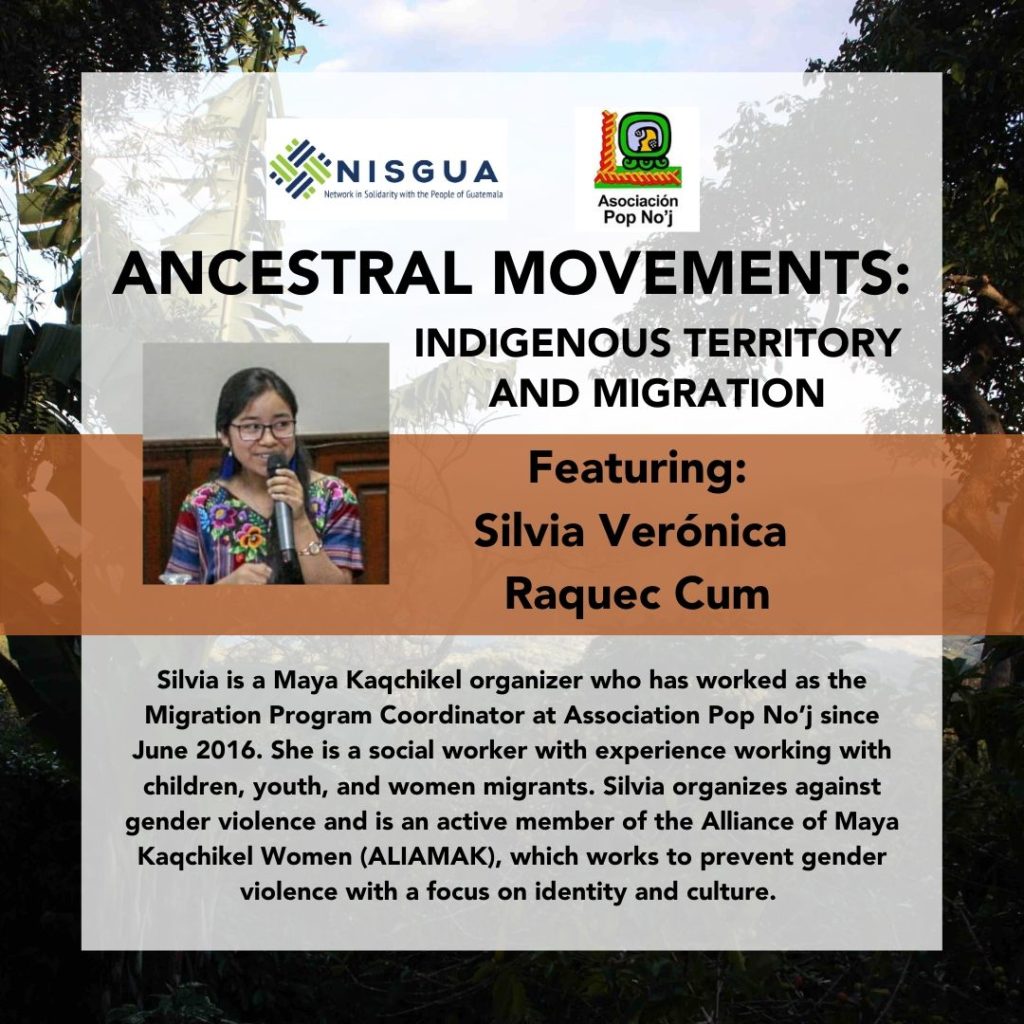
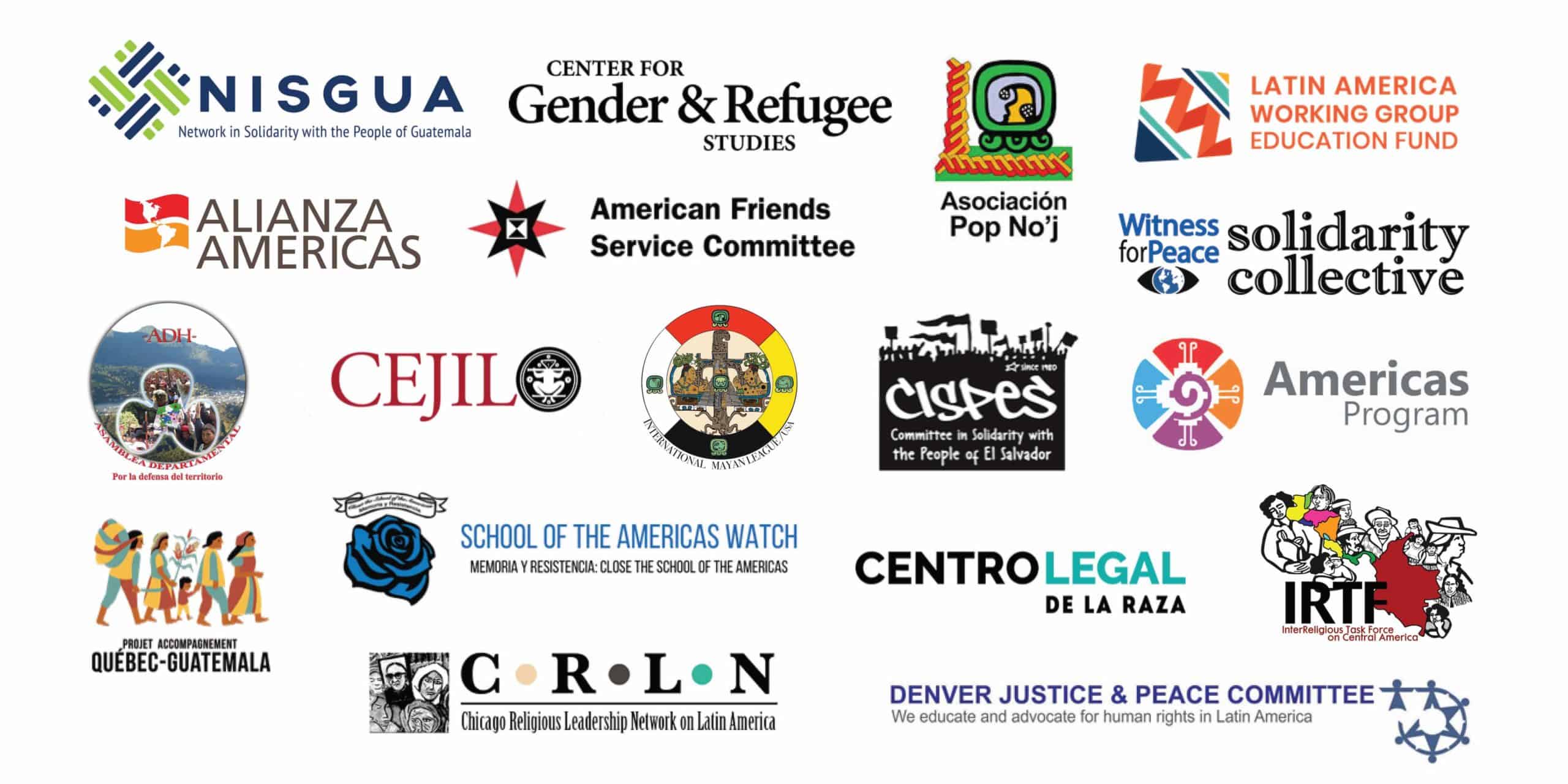
Migrants’ rights organizations deliver petition with 2000+ signatures against the Asylum Cooperative Agreements (ACAs)
Today, a broad coalition of Central and North American organizations delivered a petition to the U.S. Congress with more than 2000 signatures against the Asylum Cooperative Agreements (ACAs). The agreements, also known as “safe third country” agreements, were signed between the Trump administration and the governments of Guatemala, El Salvador, and Honduras in 2019. The ACAs allow the U.S. to transfer asylum-seekers to these northern Central American countries which they are not from, thereby closing the doors to the U.S. asylum system and violating national and international refugee law.
The petition states that the ACAs “threaten the security and dignity of migrants, and are a violation of the sovereignty of these countries.” As the U.S. Congress considers next year’s appropriations bills, “it should do everything within its power to stop the implementation of these Asylum Cooperative Agreements.” The campaign demands that the Congress defund the ACAs and demand more information about the signing, funding, and implementation of the ACAs. The ACAs were negotiated in secret and without the participation of any country’s respective legislature.
The ACAs have been rejected by the international community. As Silvia Raquec of Association Pop No’j says, “For too long, Central Americans have been forced to flee their homes. Now, they are sent to countries that they aren’t from, cornered into returning to even worse conditions that endanger their security and lives, for which the U.S. government is legally responsible.”
So far, Guatemala is the only country to implement its ACA. As a signatory of international treaties for refugee protection, Guatemala has affirmed the importance of the concept of refuge but utterly lacks the institutional infrastructure to respond to the needs of asylum-seekers. Honduras and El Salvador confront a similar situation.
More than 900 Salvadorans and Hondurans were transferred to Guatemala under the ACA. Less than 20 applied for asylum there; the majority returned to the dangers of their own countries. The ACAs are suspended due to the COVID-19 crisis, however, ACA deportations are scheduled to begin as soon as “sanitary protocols are established.” Contrary to the recommendations of international experts, the U.S. has continued deporting migrants to their countries of origin, thereby exporting COVID-19 to countries in the Global South that lack sufficient medical resources due to their collapsed healthcare systems.
The structural causes that make people flee from their home countries have not been resolved. The imposition of the ACAs only aggravates the situation of people marginalized by the state, especially Indigenous Peoples, LGBTQ people, women, and children. The coalition of organizations emphasize that there is no agreement or policy that will stop people from seeking a place where they can live a full life that is, most importantly, free from persecution and violence.
Contacts:
Claire Bransky, claire[at]nisgua.org
Daniella Burgi-Palomino, dburgipalomino[at]lawg.org

